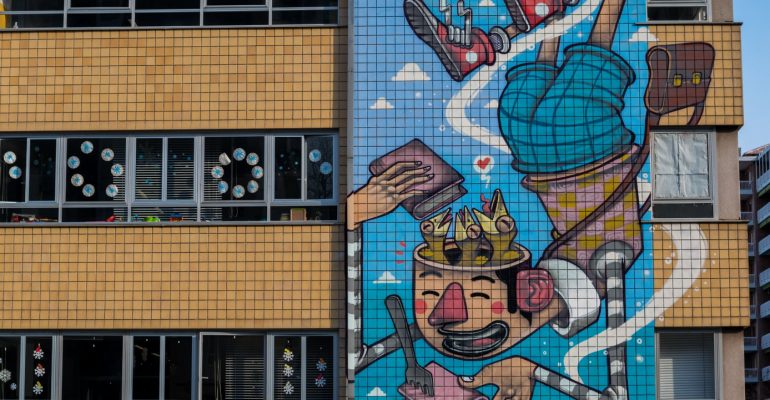
That of Turin is the leading University of the project CAPuS – Conservation of Art in Public Spaces, which involves 7 universities, 4 companies, 1 association, 1 museum, 1 research centre and 2 municipalities throughout Europe. Totally, there are 16 European partners, located in Italy, Germany, Croatia, Poland and Spain. A further one is located in the USA.
The project, developed within Erasmus+ “Knowledge alliances”, has been financed by the European Commission and aims at establishing a preservative protocol for urban art, a precious way for regenerating the city. Somewhere in between the spontaneity and the commissioning, urban artworks are becoming more and more important on city walls. However, because of their nature and of the prolonged exposure to adverse weather conditions, this artworks are more likely to deteriorate and their preservation causes some problems.
With the collaboration of companies, universities, art restorers and artist, CaPus will map the deterioration, identifying the suitable products and preservation methods (like the creation of digital archives). Moreover, in order to define a shared operational protocol, CaPus will afect also the courses on offer at University: it will be proposed a lesson plan to be inserted into the academic records and an international master on the subject. In addition, students will be actively involved in the activities of the project, thanks to internships in the partner companies.
Partners of the project will actively analyse alteration processes, define preservation strategies and deal with project communication. Also the Centro Conservazione e Restauro La Venaria Reale (centre for the preservation and the restoration La Venaria Reale) will play an important role, particularly as to regards the analytical part of characterisation of the materials of the artworks, offering a leading contribution to the creation of a training module on the preservation of the urban art. The Italian group is completed by the University of Parma, which will supervise the quality, and Medhiartis ,a communication agency which will curating the visual identity and manage the socials. The Municipality of Reggio Emilia and the Municipality of Turin are associated partners and will cooperate on identification and enhancement of the artworks chosen for the experimentation.
“The CaPus project” says Dominique Scalarone, professor of Materials for preservation and Restoration at the University of Turin and project manager of the whole project “is a unique occasion for facing in an organic, multidisciplinary and innovative way the open question about the preservation of the urban art. Starting with the creation of an international and heterogeneous by vocation partnership, totally in line with the Europeans guidelines in the field of higher education, the project aims at enhancing the cooperation between Universities and private companies in order to develop new knowledge, working opportunities and innovative products. It also aims at raising the awareness of Institutions and general public about the need of enhancing and preserving public artworks. The analysis of the materials which the artists use to realise their works, the study on their deterioration, the characterisation of the products which can be used for their restoration will be important phases of the project, functional to the achievement of the two main goals, that is the definition of a preservation protocol specific for urban artworks and the realisation of a multidisciplinary and innovative training module for university students and art restorers, also available on a digital platform”
Ilaria Saccani, president of CESMAR7, says that :”the ambition of the project is to create permanent alliances within the partnership, in order to combine the experience of art restorers and analytical groups with the knowledge of constituent materials and restoring products of companies involved in the definition of an operational innovative protocol for the preservation of urban art. This will converge into the activation of a training module in the Universities and Academy involved in the project. In this way, the contents and the project methods will enrich and innovate the courses on offer, making them more updated on the new needs of the preservation. Ultimately, the CaPus projects strives for raising the awareness of the institution, but above all of general public, about the sensitive issue of the preservation of urban art: the project will start with the involvement of the artists, in order to clear the borders of the ethic of preservation of an art which in lots of its various forms has an evanescent nature as intrinsic feature”.

Trackbacks for this post